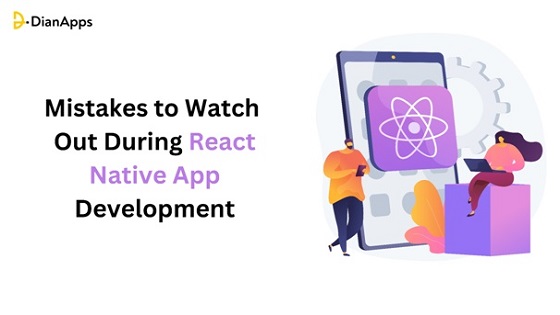React Native has more than 1.8k active contributors that are continuously contributing to its success. It is an open-source framework that is built on Javascript and has now become one of the most used cross-platform mobile frameworks for app development.
While there are many benefits of React Native for mobile app development, there are many challenges that are faced by developers as well.
In this blog, we will discuss the mistakes that should be avoided by developing an app using React Native. So let’s get started!


Why Do Developers Prefer React Native?
As compared to all other cross-platform frameworks, React Native has always been one of the favourites of many developers because of the many perks and features that are associated with this framework.
- It allows developers to create an app for both Android and iOS at the same time as it uses the same codebase for different platforms.
- Also, it has a straightforward installation process that doesn’t have any complicated installation steps.
- The thing that made React Native this popular is that it uses the most prominent and in-demand programming language “Javascript”. As many developers are already familiar with Javascript concepts they prefer React Native as they can easily work on this framework.
- Its “hot reload feature” helps in speedy app development as it allows developers to see and make changes in real-time.
- As we already know React Native is an open-source framework, it also has a strong community that if in case developers face any kind of problems they can directly go through the local area and get their concerns addressed.
Top Mistakes to Avoid During App Development
1. Inappropriate Image Optimization
In mobile app development, image optimization is a significant factor during the development process. Although a vast number of development teams forget this step as they get too occupied with the coding process. As a result, the final output will be released with images that are not aligned properly.
Image optimization helps to resize images and can be directly updated to cloud-based storage like Dropbox or Google Drive. So in order to develop a full-fledged, faster, and scalable app, proper image optimization is a very important factor that should be considered promptly.
2. Eliminating Log Statements
Programmers just could use log statements when they are developing a React Native application. This helps them in debugging the application but before continuing further process all these log entries should be deleted.
If the developers leave the log statements, it will eventually slow down the pace of the application and result in a slow responding application.
3. Mutation of State Inside Render Function
- View and Datastore are interrelated with each other as the Datastore contains all your data that is in the component and its view is rendered on the basis of the state. It then takes a new state from the data store and visualizes it on the screen.
- Now React has a setState() function which takes up a new object state and compares it with the previous state.
- Finally, a new state is merged with the previous state and sent to the state datastore.
This cycle keeps going all throughout when React Native app developers develop an application using React Native but the lifecycle also can get messed up and corrupt if the mutation of the state is done directly.
Also, this will lead to unmanageable code or even crashing of the app. That’s why mutation of state should be done carefully and properly and a child component should be constructed for content within the function.
4. Ignoring the External Module Codes
React Native app development is undoubtedly a very time-consuming process. One way by which developers can make this process a little faster is by using external modules.
Since external module codes come with completely formed codes and documentation, can increase the pace of the app development process.
However many times developers make a mistake by ignoring reading the external module codes. So developers are advised to use these modules as they can easily identify the errors that are present in the code and also help to solve them.
Use of Wrong Components
- Layouts
There are a number of reusable components and code in React Native but there could also be different layouts. However, the application page structure could be completely different for iOS and Android.
- Web Apps
While creating a web app, different endpoints that are offered by the backend should be checked correctly. The application logic can only be handled successfully when the endpoints are coded appropriately. Therefore a proper understanding of the database and endpoints is very necessary.
- Forms
When you create an app in React Native more codes should be written in comparison with the creation of the hybrid apps and estimation of validation layout should be done properly as well.
5. Improper Redux Store Planning
Planning is very important while developing an app. Often developers focus more on the app layout and experience while paying little attention to the data handling part.
So Redux store planning can be used for the proper arrangement and planning of data files. Moreover, Redux Store Planning is not required for small-scale projects and is more suitable for large-scale projects as sometimes there are last-minute changes in those projects.
Conclusion
Choosing React native for mobile app development services is undoubtedly one of the best options that are available in the market. It allows developers to build mobile applications faster as compared to any other framework.
As app development is a very complex process these mistakes should be avoided at all costs to get the best React Native app.
Limiting these above mistakes will improve the speed of the development process and make the application operations excellent and smooth.
Overall if you are looking for React Native app development services then hire a top-notch mobile app development company that will guide you through the whole process of app development and make the action easier for you.






















